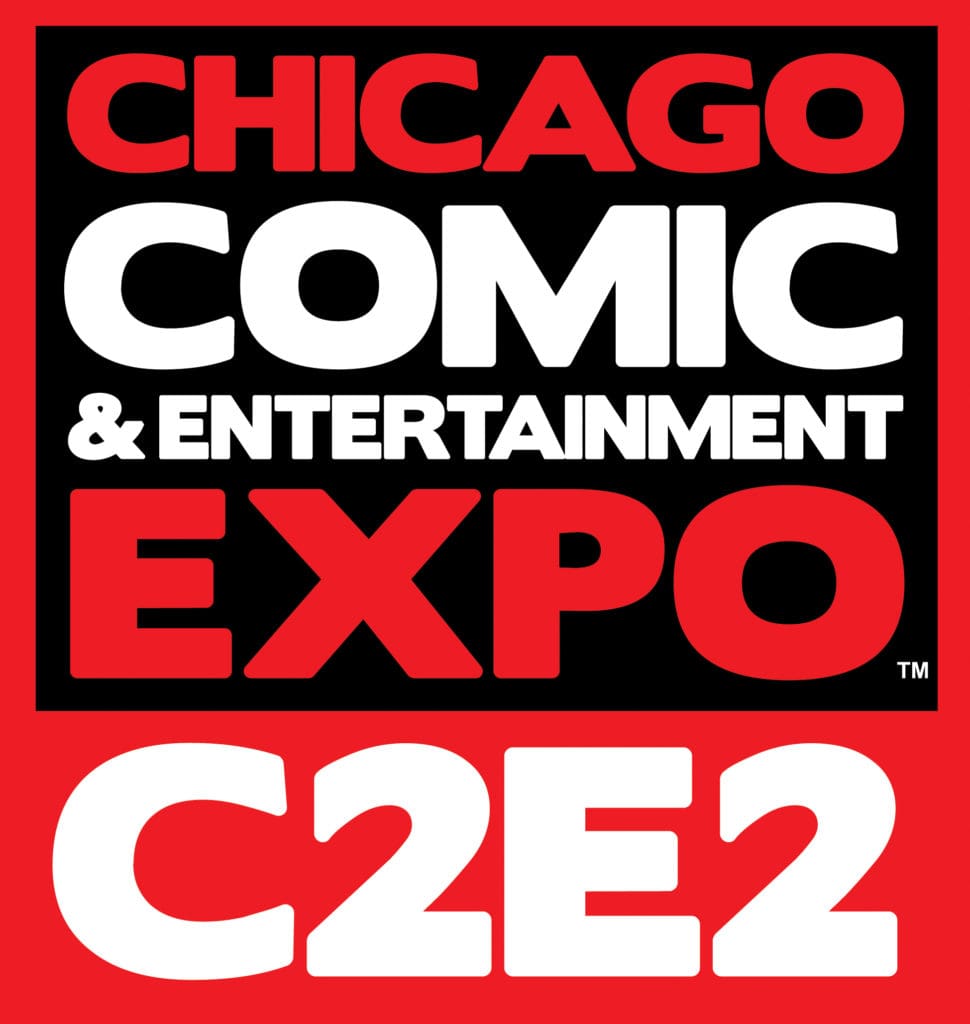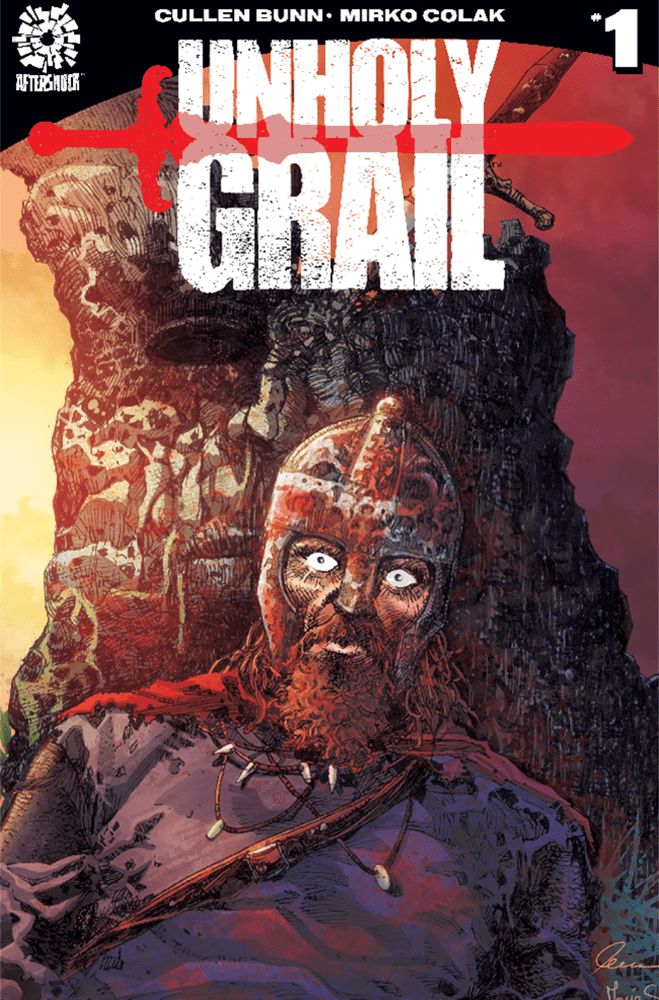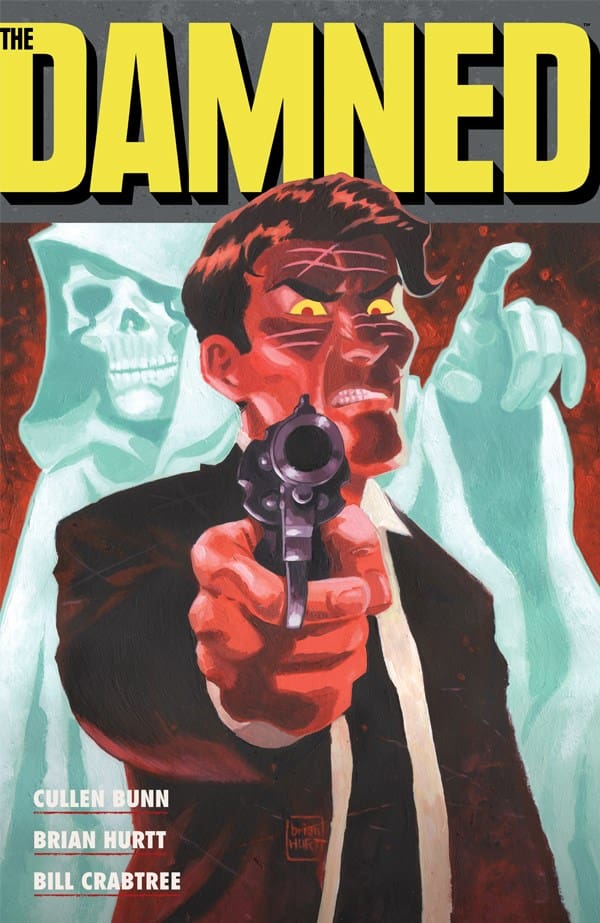Written by Rachel Freeman & Sheena Fisher
This past weekend I attended my favorite convention, Chicago Comic and Entertainment Expo (C2E2), which happens around March or April every year and takes place in Chicago, Illinois (which you probably already guessed). C2E2 is a convention I have attended every year for the past six years, I HIGHLY recommend going. But unlike every other year, this year was different. This year I had the privilege to attend the convention as a member of the press, which allowed my friend and fellow Pop Break staffer Sheena and I to talk to some amazing comic creators, including Cullen Bunn.
For those who aren’t sure who Cullen Bunn is, you should absolutely start reading his work. Or maybe you have been and you didn’t even notice. I’ve done it before. As big of a comic fanatic as I am, I’m not always the best with names. I know Cullen Bunn though. He has been the writer on a number of Marvel comics including Deadpool & the Mercs for Money, Deadpool: Back in Black, Drax, Uncanny X-Men, Moon Knight, and plenty more. What I really want to highlight though, are his independent stories.
Despite writing Marvel characters, who are usually on the more light-hearted side, Cullen Bunn’s independent works tend to be a bit more….dark and gritty. From titles like Harrow County and The Sixth Gun, Bunn has definitely his diversity and talent as a writer. An added bonus is that like Sheena and myself, he’s from the South. And it’s always great and inspirational to me, to talk to someone who has come so far despite being from a small town in the South. So obviously, getting to speak with him about comics was amazing and we hope you will enjoy it as much as we did!
What inspired you to get involved in writing comics? Because I think that, from what I’ve read, it seems like you would be a good novel writer. So what made you choose comics as opposed to any other form of writing?
You know, I’ve always loved comics. Since I was very young, I loved comics. And I just wanted to tell stories. At one point, I wanted to do novels and short stories, but I didn’t care what the medium was. I didn’t care if it was a novel, if it was a short story, if it was a comic book. I really didn’t care, I just wanted to tell stories and comics just happens to be where I was able to get some traction, I guess. So I started getting traction there and I focused on that. But even that said, I’m working on some novels and stuff now too, it’s just that comics and stuff are where I’m making my money right now. I’m trying to divide my time between comics and the novel. I’m fairly confident I’ll sell the novel when I’m done with it, but comics are a little more immediate.
And what draws you to the genre that you are associated with – the horror and the western and the grittiness?
Well the horror stuff, I didn’t grow up on horror, I mean I liked it and I watched it. I remember sneaking out in the house and watching, my older brother and sister would be watching late-night horror movies and I’d watch it from behind the couch and stuff like that. But I wanted to do fantasy – that was what I really wanted to focus on. For a long time, I wanted to write fantasy stories or science fiction stories. But at some point, when I was in high school, I decided I was going to go into Special Effects Make-Up…
That clearly worked out.
Right? Yep. But because of that I started watching a lot more horror movies and I started reading a lot more horror novels and it just clicked. And it just clicked. I started liking those kinds of stories and started wanting to tell those kinds of stories and it’s just where I feel most comfortable. I mean, I write some stuff that’s not horror, but again, I tend to always draw back on that or fall back on it because it’s what I’m comfortable with.
I know you write for Marvel and then you do your independent stuff. I guess, was there an attachment for you towards those Marvel characters or was it just kind of the opportunity came and you went with it? Because you’ve done well with it, so..
No, I’ve always loved those characters. My introduction to comics was through Marvel Comics, it wasn’t until I was older that I got into more independent stuff and stuff like that. But I’ve always loved Marvel characters, I’ve always loved Marvel comics. I write X-Men now and my dad and I used to collect X-Men comics together when I was little, so there’s always going to be a love for those characters there. When I was a kid, if you ever told me, “Hey, one day you’re going to write Marvel comics”, I would have said, “there’s no way. I don’t think that’s ever going to happen”. In a lot of ways, that was definitely a dream for me when I was younger.
So, coming from the South, did you grow up in a smaller town or…?
Yeah, I grew up in smaller towns. We moved around a little bit, but I definitely grew up in smaller communities for the most part.
And for my final question, what would you recommend or say to somebody that was in that position? You know, maybe they want to branch out into comics. What would you say to motivate them?
So, the first thing I want to say is it took me a long time to break into comics because I didn’t know how to do it. I didn’t know who I should send things to and I was sending editors my pitch for Spider-Man comics and Ghost Rider comics. I was sending pitch after pitch and getting formal rejection letters. And if I could go back in time and tell myself something, it would be “don’t focus on pitching your Spider-Man story or your Superman story. Instead, focus on doing something that’s unique to you. Do your own comic.” And that might mean you have to draw it yourself, you might have to pay an artist, you might need to find somebody and negotiate with an artist to do a book for you, you might have to self-publish it, you might have to kickstart it, but hands down – do your own book first. Don’t wait for the validation of a publisher.
Even if you want to work for Marvel or DC, do your own thing first and get that into their hands because that will show them who you are better than anything. It’s going to show them who you are as a creator better than your pitch for a Spider-Man story. And that’s what worked for me, you know? I didn’t get in working at Marvel by sending them ideas for Marvel. I got into Marvel because I did a book called The Sixth Gun, and editors at Marvel found it and they contacted me and asked me if I wanted to do stuff for them.
On the subject of growing up in a small town, I too grew up in a small Southern town and I wanted to ask, for part 1: did you have support growing up when you were like, “Hey, I’m into this nerdy fun fantasy stuff?”
No. You know, I had a tight-knit group of friends who were into the same things I was, but nowadays – a lot of times I wish I were a kid now because it’s so accepted. Nerd culture is mainstream culture, but when I was a kid, I got in a lot of trouble for liking Dungeons & Dragons and comic books. My parents were always supportive of it, they never said, “you shouldn’t be into these things”, but parents of a lot of friends did not like that stuff and a lot of other kids just didn’t see value in it; they were really cruel, I think.
That actually leads to my second question. I had the same experience, nerdiness was not cool when I was in school. So my second question is, how did you overcome the bullies to get where you are now?
I don’t know, I mean, I can’t say that I ever felt like I overcame the bullies in high school and junior high – junior high in particular was rough – and then high school was a little bit better, because I ended up making friends with the older kids and then none of the other kids would bother me. But I don’t know that I ever felt like I overcame that stuff until now. Now I feel like, if I were to go to say a high school reunion, I feel like if I were to say now, “I’m writing X-Men”, I feel like people would think “oh, that’s the movie!” You know? It’s become so prevalent now and it’s become so accepted that a lot of people think that’s cool now. I don’t know if younger people now can appreciate this kind of thing, how much nicer it is now than it used to be. I’m so happy that my son, he’s not into comics but he’s into a lot of nerd stuff, he’s 8 and he’s not going to be judged for liking these things. Because everybody likes them, it is what’s popular now.
And I feel like people are just more accepting all the way around, kids in general. I’ve always said since I was a kid, “everybody is a geek about something”, that might be sports, it might be cars, it might be comics, it might be video games, everybody is a geek about something. And I feel like people are more accepting of “that’s your geeky-ness and this is my geeky-ness” and we’re all in it together. We like what we like and there’s nothing wrong with that. Geek out about what you want to geek out about. But no, I don’t feel like I overcame what I did back then. I feel validated now that I liked it so much and to some degree, I feel like if I were worried about overcoming it or worried about proving something, then it wouldn’t feel as good to me. I feel good doing what I’m doing and I don’t need to worry about the people who didn’t like that I liked comics when I was growing up.




